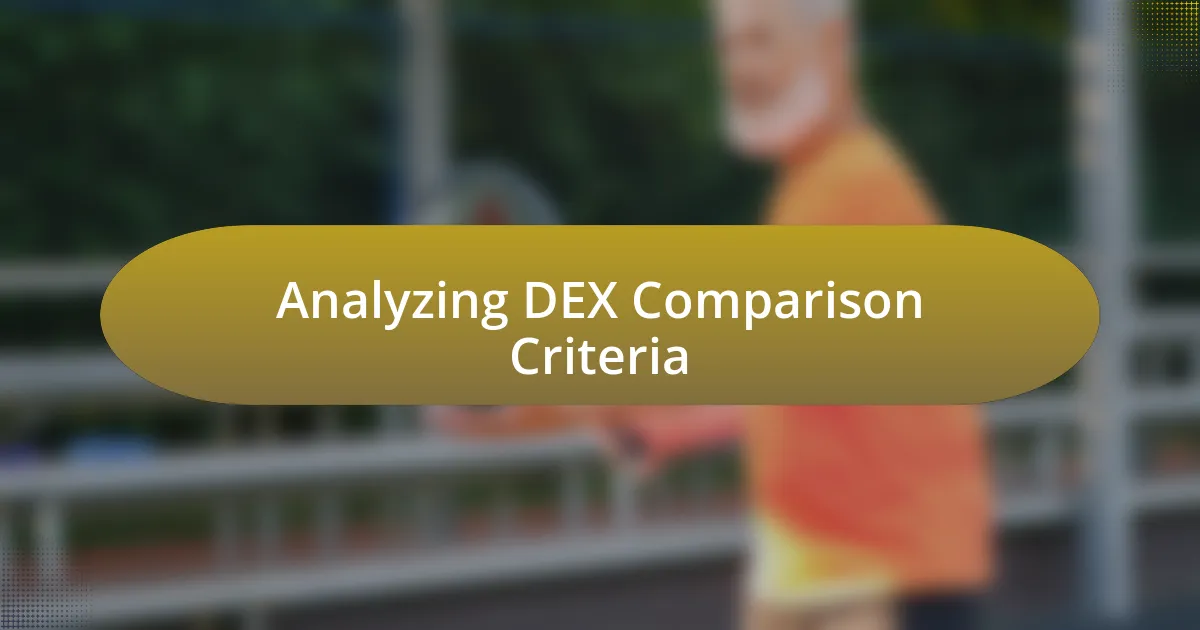Key takeaways:
- DEX comparison websites simplify decision-making by aggregating key information on liquidity, fees, and token availability.
- Decentralized exchanges empower users with greater control over funds, 24/7 trading, and lower barriers to entry compared to centralized platforms.
- Key criteria for evaluating DEXs include liquidity, user interface, security features, supported tokens, transaction fees, and community support.
- Future trends in DEX comparisons may include real-time data integration, AI-driven personalized suggestions, and enhanced educational content for users.

Understanding DEX Comparison Websites
DEX comparison websites serve a crucial purpose in the rapidly evolving world of decentralized exchanges. When I first started exploring these platforms, I felt a bit overwhelmed by the plethora of options available. How do you choose the right DEX for your needs? These websites simplify the decision-making process by aggregating information on liquidity, fees, and token availability, allowing users to make informed choices quickly.
From my experience, the beauty of these comparison tools lies in their transparency. I once spent hours manually checking different exchanges for a specific token, only to discover that a comparison site could have saved me time and effort. Not only do these websites highlight various DEX attributes, but they also provide user reviews and ratings, helping me gauge the overall reliability of each platform.
Moreover, these websites often feature advanced filtering options, which are incredibly handy when you’re on the hunt for something specific. I remember a time when I needed to trade a lesser-known altcoin. Utilizing a DEX comparison site, I could filter my search based on specific criteria and find the best possible trading pair. It was a revelation to me, demonstrating how these platforms can empower us in the decentralized finance space.

Importance of DEX in Trading
The role of decentralized exchanges (DEX) in trading cannot be overstated. I vividly remember my first experience trading on a DEX; the feeling of autonomy was exhilarating. Unlike centralized platforms, DEXs offer users greater control over their funds and trades, eliminating the need for intermediaries. It’s this liberation that makes trading a more personal and secure endeavor for many of us.
I’ve also come to appreciate how DEXs often allow for trading 24/7, a feature that aligns perfectly with my lifestyle. There were countless times when I caught myself making quick trades late into the night, fully aware that my options on centralized exchanges might be limited during off-hours. This round-the-clock availability not only provides flexibility but also enhances liquidity, which is critical for getting the best prices during market fluctuations.
Furthermore, DEXs significantly lower the barrier to entry for traders worldwide. I recall discussing this with a friend from a developing country who was eager to start trading but struggled with the high fees of traditional platforms. DEXs often have lower transaction fees, making crypto trading more accessible, and empowering individuals who might not otherwise have the opportunity to participate in the financial markets.
| Feature | DEX |
|---|---|
| Control | User retains full control of funds |
| Availability | 24/7 trading |
| Accessibility | Lower fees and accessible to all |

Analyzing DEX Comparison Criteria
Analyzing DEX Comparison Criteria is essential because it helps traders determine which platform best meets their needs. From my experience, the variety of criteria used can greatly influence not only user satisfaction but also trading outcomes. It’s particularly striking how some platforms excel in certain areas but fall short in others, making thorough analysis crucial.
When I first navigated through different DEX comparison websites, I was overwhelmed by the sheer amount of information. After some trial and error, I found key criteria that consistently stood out. Here’s what I consider important when analyzing DEXs:
- Liquidity: Higher liquidity often means better prices and faster execution.
- User Interface: A clean and intuitive design can make trading less stressful, especially for newcomers.
- Security Features: Robust security measures give peace of mind, such as two-factor authentication or regular audits.
- Supported Tokens: The variety of cryptocurrencies available can significantly affect trading choices.
- Transaction Fees: Lower fees can tremendously increase overall profitability, especially for frequent traders.
- Community Support: Active user communities can provide insights and help when technical issues arise.
As I continued to explore different DEXs, I realized how essential these criteria are. Each one affects not only the trading experience but also the ability to respond swiftly to market changes. By understanding these factors, I felt more empowered to make informed decisions and optimize my trading strategy.

Common Mistakes in DEX Comparisons
One common mistake I often see on DEX comparison websites is the oversimplification of liquidity. Many platforms merely categorize DEXs as having “high” or “low” liquidity without a deeper analysis of how that liquidity affects trading in real-time. I remember being caught off guard by this when I chose a platform that looked great on paper, but during peak trading hours, liquidity dried up, leading to slippage that cost me significantly.
Another frequent pitfall is the failure to account for evolving user interfaces. What might be user-friendly today could become cumbersome tomorrow as platforms update their designs. I’ve experienced this first-hand with a DEX that initially offered a seamless interface but rolled out changes that turned my trading experience into a frustrating maze. It’s vital to look for user feedback and reviews about recent updates, not just the current layout.
Moreover, many comparisons neglect the importance of community support. I’ve found that a vibrant community can be incredibly beneficial for solving technical issues or exploring new trading strategies. When I faced a problem with a transaction, it was the insights from fellow traders in the platform’s forum that turned my anxiety into action. Why overlook such a critical aspect? Engaging with user forums can provide valuable insights that comparison charts often miss.

Future Trends in DEX Comparisons
As I look ahead, I see an increasing trend towards real-time data integration in DEX comparison websites. Imagine having access to live trading analytics right at your fingertips, allowing you to make informed decisions on the fly. When I think about how much time I used to spend refreshing pages to check prices, I can’t help but feel excited about the prospect of streamlined information gathering.
Another emerging trend is the use of AI and machine learning algorithms to enhance user experience. This technology could offer personalized suggestions based on a trader’s history and preferences. Just the other day, I thought about how helpful it would have been if my DEX comparison tool had analyzed my past trades and pointed out better options tailored just for me. This customization could truly transform the way we approach trading.
Moreover, I anticipate a shift towards more educational content accompanying comparison features. Experienced traders often overlook the nuances of protocols, but for new users, these insights are invaluable. Reflecting on my own journey, I remember how I wished for more guidance when I started out. Comprehensive guides that explain the intricacies of different DEXs alongside comparison tools could make all the difference for newcomers navigating this complex landscape.

